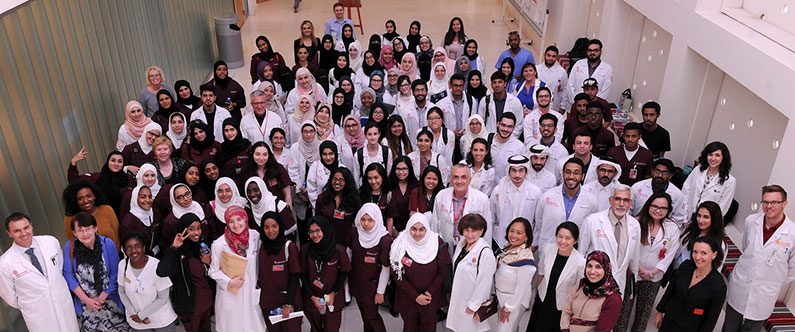Healthcare students from four colleges unite to improve patient care
 Healthcare students from WCM-Q, Qatar University College of Pharmacy University of Calgary in Qatar and the College of the North Atlantic – Qatar took part in the joint learning exercise at WCM-Q.
Healthcare students from WCM-Q, Qatar University College of Pharmacy University of Calgary in Qatar and the College of the North Atlantic – Qatar took part in the joint learning exercise at WCM-Q.
More than 100 students from four of Qatar’s leading healthcare colleges convened at Weill Cornell Medicine-Qatar (WCM-Q) for a day of inter-professional education (IPE) workshops designed to foster collaboration among trainees of four different health professions.
A total of 116 students comprising trainee pharmacists, doctors, nurses and respiratory therapists from Qatar University College of Pharmacy (QU CPH), WCM-Q, University of Calgary in Qatar (UCQ) and the College of the North Atlantic - Qatar (CNA-Q) respectively, met at WCM-Q to learn vital collaborative working skills to help them deliver coordinated care packages when they enter the healthcare profession after graduation. This was the sixth IPE session to be held by these colleges during the 2016-17 academic year, and the second to be held at WCM-Q. IPE activities are organized by the Inter-Professional Education Committee (IPEC), which convenes at Qatar University and includes representatives from most of the healthcare colleges in Qatar.

After an icebreaker session, the students worked in groups to consider care scenarios in which an elderly female patient had been admitted to hospital following a stroke. In each training scenario the students were presented with different challenges, such as the patient suffering from pneumonia, an outbreak of flu at the hospital that caused regular nurses to be replaced by inexperienced agency staff, and the patient having a severe allergic reaction to her medication.
The students of all four professions worked from the same evidence-based literature on systems-based healthcare and effective patient sign-off procedures, which they discussed in groups, learning from each other’s impressions of the material. They then applied the theories put forth in the literature to analyze a patient’s journey through hospital, identifying the points at which safety ‘breakpoints’ that compromised the patient’s health occurred, and proposing ways these errors could be prevented.
The students gained key knowledge of dealing with systems issues such as ways to work safely despite disruptive challenges, including staff shortages, shift changes and issues with electronic health records. This is very pertinent as Qatar’s healthcare sector relies heavily on electronic health records, which, when used effectively, can minimize medical errors.
WCM-Q second-year medical student Nasser Binmarzook said: “I think this form of collaborative learning is very beneficial. We know that we will need to work closely with other healthcare professionals in order to serve our patients so it is essential to understand how nurses, pharmacists and respiratory therapists work and how our different skills can complement one another. It is good to begin learning to communicate with one another effectively at this early stage.”
Katarina de Pedro, a third-year respiratory therapy student at the College of the North Atlantic - Qatar, said: “I really learned a lot from this session. For me, the most valuable thing was simply beginning to communicate with people from other professions. It’s clear that good communication is really key to providing good care to patients.”

Inter-professional education has emerged as a key element in the training of healthcare professionals in recent years in response to developments in medical science that have made care packages more sophisticated and complex. As such, WCM-Q, QU CPH, UCQ and CNA-Q have united to form and support communities of inter-professional learners. The learning objectives and case study scenarios for this IPE activity were developed collaboratively by faculty from each of the four colleges prior to the event, and delivered by 20 experienced faculty members who facilitated the activity.
Ikram Zoukh, a second-year student at Qatar University’s College of Pharmacy, said: “It was amazing – I discovered so many things about the other health professionals that I didn’t know. I think we all found it extremely helpful to come together and actually interact and work with students from other health professions rather than simply learning about what they do from a book. I’m very excited to take part in other inter-professional education exercises during my training.”
Hodan Ahmed, a second-year nursing student at University of Calgary in Qatar, said: “This was my first experience of joint learning with doctors, pharmacists and respiratory therapists and I think it was very useful. I think that learning together while we are still training makes it far easier to communicate with one another than if we were to wait until we are all fully qualified and already busy in the hospital.”